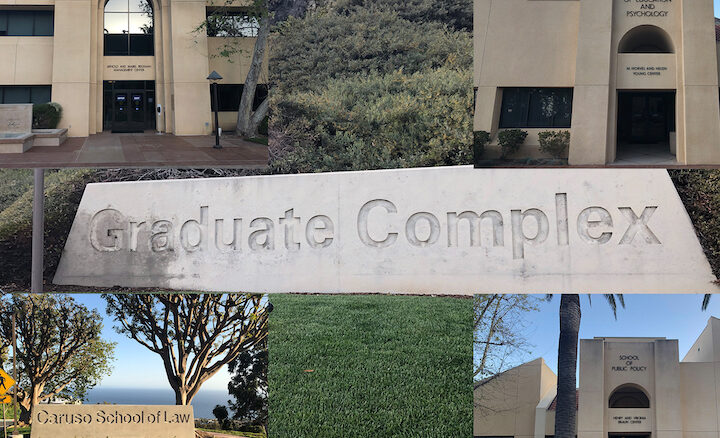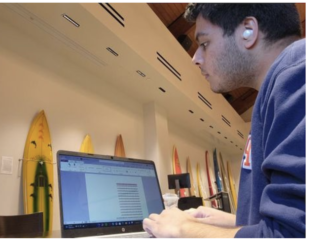
In a volatile economy, more students are choosing to extend their education by going to graduate school.
Pepperdine has felt the full force of this nationwide impact.
National graduate enrollment grew at nearly three times the pre-pandemic rate, according to the National Student Clearinghouse Research Center. Pepperdine graduate programs have seen similar increases.
Experts attributed this increase to a number of factors, including the increased availability of online courses and an unsteady job market.
“More people might believe that they actually have the conveniences and the flexibility necessary to start their degree,” said Arman Davytan, assistant dean of enrollment management at the Graziadio Business School.
Seniors at Seaver College have had a significantly different experience applying for graduate programs than students before them, from virtual interviews to virtually no recruitment events. Pandemic driven changes that administrators and faculty members are making, such as rethought applications and more online education, may be here for good.
Graduate programs by the numbers
Across the country, graduating college seniors have been applying to graduate school at higher rates than ever before. Almost every program, from MBAs to PhDs, has seen a substantial increase in applications and enrollments.Overall graduate enrollment has increased 4.3% from last year, according to the National Student Clearinghouse Research Center. Across the board, students are choosing to wait out the recession rather than jump right in. Total hires (across all degree levels) will be down 2% compared to hiring levels of a year ago, according to a Michigan State UniversityCollegiate Employment Research Institute report.
There was an 18% increase this year in medical school applications nationwide compared to 2019. In the past decade, year-over-year increase has averaged less than 3%, according to an Association of American Medical Colleges report. Experts and administrators point to an increased need for medical professionals as well as greater job security as driving factors behind this increase.
Applications to American MBA programs rose for the first time in five years, increasing by 21%, Patrick Thompson wrote in a Nov. 10 Wall Street Journal article. Business programs have become attractive to working professionals who may have lost their jobs early in the pandemic and are using the extra time to increase their skill set and bolster their resume.
Pepperdine graduate programs have seen similar increases
Some of Pepperdine’s graduate programs have seen similar increases in applications.
The Graziadio Business School has seen a 10% increase in applications this year, and a 23% increase over the number of applications from two years ago, Davytan said.
Davytan also said the increase they have seen is similar to the increase they saw after the recession of 2008. While the surge over a decade ago was not pandemic driven, the motivation to consider graduate school may have been similar.
At the Graduate School of Education and Psychology (GSEP), all but one of their 20 programs have seen an increase in applications, said Luke Phillips, executive director of marketing and enrollment at GSEP.
The one program that hasn’t seen an increase is almost entirely made up of international students. Due to travel restrictions, applications have been down in that program.
In contrast, some specific programs have seen a decrease. For example, the American Studies master’s program and the three graduate religion programs at Seaver College have seen a slight decline, said Dana Dudley, assistant dean of Special Academic Programs at Seaver College. Dudley attributed part of the decrease to the fact that many of the students in the American Studies master’s program are working teachers, and so they have had an increased workload due to most K-12 schools switching to an online format.
Shannon Phillips, dean of Admissions and Student Services at the Caruso Law School did not respond to requests to schedule an interview.
Applications are changing
The process of applying to these graduate programs has had to change slightly as well. Like many schools across the country, some Pepperdine graduate programs have gone “test-optional,” which means standardized tests like the GRE are not required at the moment. Graziadio Business School and the Seaver College graduate programs have both gone test-optional, Davytan and Dudley said.
Admission officers have had to rethink other common admission practices too. In many cases, in-person interviews are a large part of graduate applications. During the pandemic, graduate schools have transitioned to virtual interviews, over Zoom or other video conferencing software. In some cases, schools are asking for pre-recorded videos of students answering interview questions.
Graduate fairs and other recruitment events have also fallen to the wayside.
“You used to be able to go to graduate fairs, and do table visits, and college fair night and stuff like that,” Phillips said. “So there’s been none of that.”
For students, there are pros and cons to the lack of in-person interaction.
“On the applicant side it’s made things immensely cheaper,” said Brandon Oddo, a senior pre-med student and art minor. “You don’t have to pay for plane flights and hotels and you don’t have to set aside two or three days. You just set aside a few hours.”
Some students also believe they aren’t able to learn what they want about prospective schools from a purely virtual viewpoint.
“While you were there it was a good way for you to get to understand a little bit more about the community, and if you see yourself actually sitting there and wanting to go there,” senior psychology major Hannah Rouse said. “But with that being all virtual it’s really hard to do that, and there were no campus visits, so it is also really kind of hard to figure out do I even like this place or not.”
How Pepperdine seniors are reacting to the changes
Many of Pepperdine’s students continue on to some sort of graduate program, with 85% of the class of 2019 gaining acceptance to a graduate program and 19% choosing to enroll after graduation, according to the Seaver College Career Center. So it is no surprise that most had plans to attend a graduate program even before the pandemic.
“I think the majority of people that I know were planning on it,” said Carmen Conforti, a senior sports medicine major. “Or were planning on going eventually and because of the pandemic, they were kind of inspired to just start figuring it out now.”
Even in the case of seniors who are focused on the job market, graduate school may still be in the picture.
“Most of the seniors I know have getting a job as their priority, but most of them have applied to one or two graduate schools as a backup,” said Emily Harris, a senior international studies major.
Harris decided not to apply to a graduate program after some consideration. In the end, Harris thinks that real-world experience would be more worthwhile, but still said graduate school may be in her future.
“I really do want to eventually do graduate school,” Harris said. “I’ve kind of had a lot of talks with mentors and family members who have guided me in the direction of waiting, especially for my major and my career path.”
Students are now more comfortable with online learning, which may make graduate studies easier in the future. For both full and part-time students, earning a terminal degree may be more convenient due to increased accessibility and flexibility.
“I think in the future if I wanted to get a graduate degree and wanted to work at the same time, going to online school would be a lot more feasible,” Harris said.
The future of graduate programs
After the pandemic, higher education will likely look different. In the last year, students and faculty alike have adapted to new methods of learning, teaching and organizing that may reap benefits in the long run. Some of these changes may have been slowly starting even before the pandemic. Test-optional applications, increased amount of fully online courses, integration of new virtual learning technologies and virtual interviews may be here to stay.
“We’re in such a crazy time with higher ed,” Phillips said. “The market was already changing and being disrupted in so many ways before the pandemic, that the pandemic came along and really accelerated some of those things we already have been seeing.”
With many schools going test-optional, application requirements will certainly change, Phillips said. Educators also will be incorporating more digital elements into the classroom. Phillips is not the only one to share this view that higher education is shifting.
“I think whether it’s graduate education or just education as a whole, I think there’s some technologies that we’re going to have,” Dudley said. “I even think in the world of employment we’re going to see how we can use these technologies to do our jobs better.”
When it’s all said and done, even the highest levels of education have undergone a major upheaval. While the pandemic has brought challenges, it has also brought change, change that many think is for the better.
“We figured it out,” Davytan said. “We stretched ourselves intellectually and logistically to try to figure out a way to still deliver a quality learning experience.”
Joe Allgood completed the reporting for this story in Jour 241 in Fall 2021 under the supervision of Dr. Christina Littlefield and Dr. Theresa de los Santos. Dr. Littlefield supervised the web version of the story.




